
Why You Can Trust CNET
You can get good phones under $200 because they’re now more functional than ever. For instance, the Samsung Galaxy A14 5G supports faster data with its 5G connectivity and contactless payments over NFC — both of which are fairly new to phones at this price range. Other phones, like Motorola’s Moto G Stylus, are becoming better media machines, providing stereo speakers to improve audio quality while including cameras that take decent photos.
Yet these cheaper phones do have several noticeable trade-offs: They usually run slower than more expensive phones, and while they’ll usually ship with the latest version of Android, there might be only a short window of security update support. That last issue is crucial to remember when shopping in this price range, as it’s risky to use a phone that’s no longer being protected against security vulnerabilities by its manufacturer.
While we wouldn’t consider any of these picks to be productivity machines, these phones are likely going to be more useful than you would expect for the price. Plus, some of these devices might end up being “free” when signing up with a phone carrier’s subsidization program — usually requiring a two-year commitment in order to get the cost covered.
What’s the best phone under $200?
The $200 Samsung Galaxy A14 5G is our current top pick for the best phone under $200. This is largely because of its inclusion of 5G support for faster data, NFC support for contactless payments and a fairly generous software and security support timeline when compared to other phones in this price range. Samsung will be providing two years of software updates and five years of security updates to the Galaxy A14 5G, making it a phone that can be safely used for several years if you choose to.
We’re not crazy about its photography, and if that’s more important to you than 5G, you should also take a look at the $200 Moto G Stylus for its better camera quality.
If you need a phone that’s even cheaper, we’re also keeping around the $160 Galaxy A03S in this list. That device is still being supported by Samsung, but keep in mind that it has only a tiny 32GB of storage space.
Best phones under $200 of 2024
Show less
The $200 Samsung Galaxy A14 5G is one of the most functional phones under $200 available right now. Although it’s at a budget-friendly price, this Samsung phone includes 5G support for faster data and NFC for contactless payments using Google Wallet. While both of those inclusions are highlights for this price range, Samsung is also planning to support the Galaxy A14 with two years of software updates and five years of security updates, making it a phone that will be safe to use for several years.
You should still keep in mind that the phone does have tradeoffs to hit its $200 price. It has a drab design, a slower processor and mixed photography performance.
Despite its issues, the features it does include make it an easy recommendation if you are buying the phone outright or if it’s offered for free with a carrier subsidy deal.
Pros:
- NFC for contactless pay
- 90Hz refresh rate
- Good software and security update timeline
Cons:
- Sluggish performance
- Mixed photography
- Single audio speaker
Show expert take Show less
Show less
The $200 Moto G Stylus doesn’t have 5G but instead includes a built-in stylus along with a decent 50-megapixel main camera. The Stylus did a nice job taking photos while I was in a variety of environments, including indoors and outdoors. I enjoyed the phone’s take on Portrait mode, and it captured a clear photo of the plant wall in CNET’s New York office that I use for photo testing. The 6.5-inch 720p display is also able to run at a consistent 90Hz refresh rate, providing smooth animations while navigating apps and reading websites.
The phone is otherwise let down by Motorola’s software and security update policy for its G series of phones, covering only one software update and three years of security updates. That, combined with the lack of 5G or NFC, means that while it’s a great choice for better pictures, there are a number of ways this phone could become left behind as the years pass. If you’re planning on using this phone for only two to three years, you could get a lot of value out of this device.
Pros:
- Nice photos for the price range
- Decent performance for most tasks
- Two-day battery
Cons:
- Stylus feels superfluous
- Short update timeline
- Lacks 5G connectivity as similarly priced phones start to include it
Show expert take Show less
Show less
Samsung’s Galaxy A03S at $160 (roughly £130, AU$240) could still be a great fit for someone looking for the cheapest possible phone that can handle most essential tasks. The phone’s 6.5-inch screen, capped at 720p resolution, is capable of reading the news, watching videos and playing games. Despite some performance lag found during our review, the phone is good at multitasking. The phone’s tiny 32GB of storage space could fill up fast, so if you’re considering this phone, it may be worthwhile to think about expanding the storage with a microSD card.
The A03S, first released last year, is getting four years of security updates, meaning that there are still three left. It’s less clear how many Android version updates are scheduled, and unlike the newer A14, it does not have 5G support or NFC. While those two benefits along with the A14’s 64GB of internal storage are worth the extra $30 price increase, you can still get some mileage out of the A03S if you are simply looking for the cheapest Samsung phone possible.
Pros:
- 3GB of RAM helps the phone multitask
- Blue color option
- Includes fingerprint sensor
Cons:
- Very little onboard storage
- Some noticeable lag
- Indoor photos are challenging
Show expert take Show less
Show less
The $170 Moto G Play’s best feature is how its 5,000-mAh battery can stretch itself to three days of battery life. Beyond that, it’s important to disclose that this device is one of the more frustrating phones for under $200.
The phone’s MediaTek Helio G37 processor and 3GB of RAM had a challenging time loading apps, and its 32GB of space filled up quickly. The phone does include a microSD card slot for storage expansion. Photography was also consistently fuzzy, and the $160 A03S easily outdid the Moto G Play in my photography test.
Despite being released in 2023, the Moto G Play ships with Android 12 and will receive only one software update to Android 13. It will also receive three years of security updates, which is standard for Motorola’s G series of phones.
Ultimately, I am including this phone on the list due to its long-lasting battery, but its limitations may lead you to consider other options on this list.
Pros:
- Long battery life
- Clean version of Android 12
- Three years of security updates
Cons:
- Frequent lag, issues loading software
- Questionable refresh rate
- No “twist to open camera” gesture
Show expert take Show less
These cheaper devices tend to scale back significantly in one area or another in order to achieve those low prices. Most commonly, these drawbacks include limited software support, carrier support or bloatware (preloaded apps that you never asked for). These trade-offs often mean that these devices should not be used after two to three years, especially after security update support ends.
It’s also notable that while these phones retail for $200 or less, many of them are often available at a deep discount — or even for free — as part of a carrier subsidy deal. If you are planning to stick with the same wireless carrier for two years, these phones could just become part of the cost of your service.
Every phone on this list has been thoroughly tested by CNET’s expert reviews team. We actually use the phone, test the features, play games and take photos. We assess any marketing promises that a company makes about its phones. If we find something we don’t like, be it battery life or build quality, we tell you all about it.
We examine every aspect of a phone during testing:
- Display
- Design and feel
- Processor performance
- Battery life
- Camera quality
- Features
We test all of a phone’s cameras (both front and back) in a variety of conditions: from outdoors under sunlight to dimmer indoor locales and nighttime scenes (for any available night modes). We also compare our findings against similarly priced models. We run a series of real-world battery tests to see how long a phone lasts under everyday use.
We take into account additional phone features, like 5G, fingerprint and face readers, styluses, fast charging, foldable displays, and other useful extras. We weigh all of our experiences and testing against the price, so you know whether a phone represents good value.
Read more: How we test phones
Samsung Galaxy A14 5G vs. Motorola Moto G Stylus (2023) vs. Samsung Galaxy A03S vs. Motorola Moto G Play (2023)
undefined
| Samsung Galaxy A14 5G | Moto G Stylus (2023) | Samsung Galaxy A03S | Moto G Play (2023) | |
|---|---|---|---|---|
| Display size, resolution | 6.6-inch FHD+ LCD display, (1,400 x 1,080 pixels), 90Hz | 6.5-inch IPS LCD; 1,600×720; 90Hz refresh rate | 6.5-inch HD+ LCD (720×1,600 pixels) | 6.5-inch IPS TFT LCD; 1,600×720 pixels; 90Hz refresh rate |
| Pixel density | 268 ppi | 269 ppi | 269 ppi | 269 ppi |
| Dimensions (inches) | 6.6 x 3.07 x 0.36 in. | 6.41 x 2.91 x 0.36 in. | 6.5 x 2.9 x 0.3 in. | 6.58 x 2.95 x 0.36 in. |
| Dimensions (millimeters) | 167.6 x 77.9 x 9.1 mm | 162.9 x 74.1 x 9.2 mm | 165.8 x 75.9 x 9.1 mm | 167 x 77 x 9.4 mm |
| Weight (grams, ounces) | 203 g (7.19 oz.) | 195 g | 202g (7.13 oz.) | 203 g (7.16 oz.) |
| Mobile software | Android 13 | Android 13 | Android 11 | Android 12 |
| Camera | 50-megapixel (main), 2-megapixel (macro), 2-megapixel (depth) | 50-megapixel (main), 2-megapixel (macro) | 13-megapixel (wide), 2-megapixel (depth), 2-megapixel (macro) | 16-megapixel (main), 2-megapixel (macro), 2-megapixel (depth sensor) |
| Front-facing camera | 16-megapixel | 8-megapixel | 5-megapixel | 5-megapixel |
| Video capture | 1080p at 30fps | 1080p at 30 fps | FHD (1920×1080 at 30fps) | 720p at 30 fps |
| Processor | MediaTek MT6833V | MediaTek Helio G85 | Octa-core processor | MediaTek Helio G37 |
| RAM/Storage | 4GB + 64GB | 4GB + 64GB; 4GB + 128GB | 3GB/32GB | 3GB + 32GB |
| Expandable storage | Yes | Yes | Up to 1TB | Yes |
| Battery/Charger | 5,000 mAh | 5,000 mAh (15W charging) | 5,000 mAh (charger not included, does not support wireless charging) | 5,000 mAh (10W charging) |
| Fingerprint sensor | Side | Side | Side | Rear |
| Connector | USB-C | USB-C | USB-C | USB-C |
| Headphone jack | Yes | Yes | Yes | Yes |
| Special features | 5G-enabled, NFC, 15W charging | Stylus, Moto Gestures | 3-day battery life, Moto Gestures, Auto Smile Capture, Portrait Mode |
Are cheaper phones worth it?
What about phones that are even cheaper, like under $100?






